

Treasury Secretary Steven Mnuchin called it a “trade dispute” while House Majority Leader Kevin McCarthy called it a “trade discussion,” but the rest of the world is calling it a “trade war.” Regardless of the nomenclature, the disagreement-by-any-other-name has reared its ugly head on the U.S. automotive market. German automaker BMW has now offered its opinion on the domino effect that newly imposed U.S. tariffs have brought to the auto industry.
In a letter to U.S. Secretary of Commerce Wilbur Ross, BMW wrote words of caution to U.S. politicians, stating that the international response to President Donald Trumps’ threat of imposing additional tariffs up to 20 percent would only hurt more domestic jobs and investments. With the European Union imposing equivalent retaliation tariffs on the U.S., Trump’s latest threat of forcing tariffs onto vehicle imports is not to be taken lightly, sparking a complaint to the World Trade Organization over what it views as “pure protectionism” import duties levied against trade bloc members.
Currently, BMW employs more than 8,000 factory workers at its largest operational manufacturing plant, located domestically in South Carolina. This particular factory builds nearly 500,000 vehicles annually, almost 40 percent more cars than BMW sells in the U.S. as a whole. The majority of these vehicles are then exported to other countries including Canada and the EU. Should it become unprofitable for BMW to continue operations within the boundaries of the United States, it may move operations elsewhere, rendering up to 8,000 workers without jobs and a substantial loss in local economic growth.

Stemming from an unbalance in international import duty fees which Trump called “stupid trade,” the U.S. deemed an appropriate negotiation tactic was to implement 25 percent tariffs on imported steel and 10 percent tariffs on imported aluminum, so long as the metals originated from Canada, European Union, or Mexico. At one point, the administration sought justification by investigating if international automakers building their vehicles in the United States posed a threat to national security.
Canadian Prime Minister Justin Trudeau called the tariffs “insulting and unacceptable” and released a list of items that it would retaliate by counter-tariffing as much as 25 percent beginning July 1. The European Union has also agreed to implement retaliation tariffs, already going tit-for-tat by imposing its own 25 percent tariff on $3.2 billion in Americanized goods that include motorcycles, peanut butter, whiskey, and tobacco.
“All of these factors would substantially increase the costs of exporting passenger cars to these markets from the United States and deteriorate the market access for BMW in these jurisdictions,” wrote BMW in its letter, hinting that an increase in automotive tariffs could potentially lead to “strongly reduced export volumes and negative effects on investment and employment in the United States.”
Some may refer to BMW’s letter as simply being agitprop, however, other industry players such as Harley Davidson (and potentially Indian) have already announced plans to move bulk production outside of the U.S., largely due to the precarious future of domestically-produced and internationally-traded automotive products. The additional European tariffs alone would have cost Harley Davidson in excess of $88 million for the number of motorcycles it sold in Europe during 2017.
A report by the U.S. Department of Commerce explores the avenue that the NAFTA agreement, a supersedure of the Canada-United States Free Trade Agreement (FTA) that brought forth the inclusion of Mexico and was heavily criticized by Trump as being the “worst trade deal ever made,” is responsible for “killing” U.S. jobs in the automotive sector. The data behind the report suggests that this conclusion was drawn due to the lack of parts being sourced from countries participating in NAFTA, many of which are no longer used in auto manufacturing. Those parts which are still used are said to have been sourced from non-participating countries, breaking the “rules of origin,” then modified and resold as being NAFTA-compliant. This workaround is primarily the premise of the report’s argument, stating that it alone is responsible for the “killing” of the jobs.
In actuality, trade between the United States and its neighboring countries has tripled in the time since the original FTA agreement was passed, ultimately resulting in the complete lifting of tariffs and quantitative restrictions by 2008, meaning that domestic automakers like Ford could build its vehicles in Mexico and import them duty-free into the United States.
BMW believes that by the United States pushing its protection tariffs on the world, it will effectively limit the investments that foreign automakers are willing to make on American soil, effectively costing jobs and stymieing local economic development across the country. Additionally, the automaker believes that domestic manufacturers will have less of an incentive to improve their own products, effectively removing the need to produce goods at a lower cost or better quality. This coincides with claims made by two organizations that represent several domestic and foreign automakers, the Association of Global Automakers and the Alliance of Automobile Manufacturers, that successful implementation of the tariffs will result in the loss of “hundreds of thousands of American [manufacturing] jobs”, and would undoubtedly force a price hike delivered to the consumer.